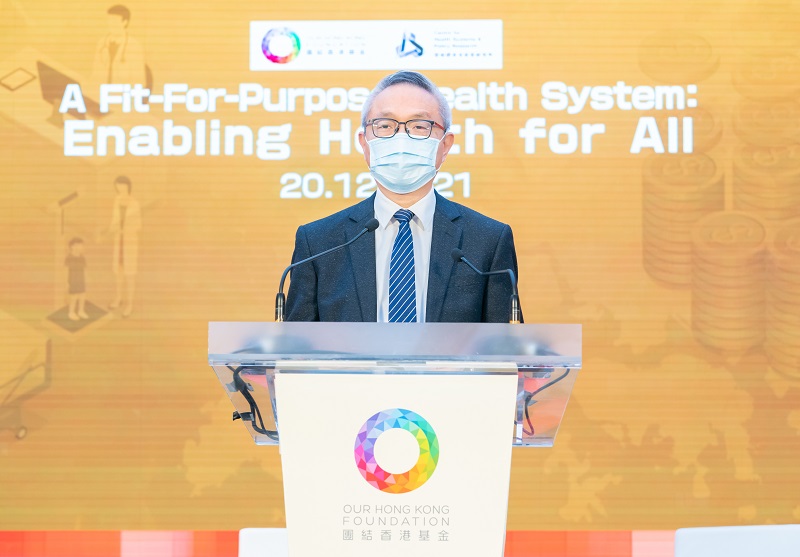Strategic Purchasing: Enabling Health for All
A Research Report on Strategically Organising Hong Kong’s Health Financing System
(20 December 2021, Hong Kong) Our Hong Kong Foundation (the "Foundation") has launched a report on how to strategically organise Hong Kong’s health financing system, titled Strategic Purchasing: Enabling Health for All, during a symposium on enabling “Health for All” in a primary care-led health system. Building on the Foundation’s 2018 award-winning health policy report Fit for Purpose: A Health System for the 21st Century, the latest Report points out that Hong Kong’s health system is still not fit to cater for the emerging healthcare demands shaped by the needs of a rapidly ageing population and growing chronic disease burden. Key findings highlight the importance for available resources within Hong Kong’s current health financing portfolio to be allocated more strategically for health system objective and be directed towards prioritised healthcare services. The health financing instrument “strategic purchasing” was positioned as a key policy lever for health system transformation towards a primary care-led integrated care system to meet changing population needs. The Report demonstrates the application of strategic purchasing to enhance the accessibility and affordability of needed primary care in Hong Kong. Leveraging the momentum of the Government’s achievements in primary healthcare development and in anticipation of the city’s primary healthcare blueprint, the Foundation calls on the Government to consider the implementation of a proposed scheme designed to incentivise early detection and management of common chronic diseases.
Achieving an Integrated Care System to Enable Health for All
The world was reminded this month on International Universal Health Coverage Day that there are people in the world still waiting for health and the importance of ensuring access to quality health services without financial hardship. The goal that all nations should be striving to achieve is to prioritise quality, access, and equity of care attainable through not just investing more in health, but also allocating resources more efficiently to meet population needs that will ultimately enable health for all.
There are people in Hong Kong still waiting for health. The Foundation’s 2018 policy report put forward that Hong Kong’s specialist and episodic care-focused health system characterised by an underdeveloped primary healthcare system, segmented public-private healthcare service delivery and service fragmentation is no longer fit to meet emerging healthcare needs of a rapidly ageing population. The Report recommended system-level transformations towards an integrated, person-centred, primary care-led health system which is the only way to effectively address the challenge of a growing chronic disease burden.
In making Hong Kong’s health system better cater for changing healthcare needs, the Government's strategic goals are to improve primary care provision and recalibrate the public-private mix to relieve pressure on Hong Kong’s overburdened public healthcare system. However, a crucial omission in these stated goals that can inform the appropriate recalibration to meet population health needs and decrease demands on the public sector is “integrated patient care”. Integrated healthcare aims at enabling timely access to a full spectrum of preventive, curative, rehabilitative and palliative care needed and appropriate for the individual across primary, specialist secondary and tertiary levels of care provided in different settings by different providers. Achieving integrated healthcare will minimise unnecessary duplication and bridge gaps in provision and care, reduce health provision inefficiencies thereby enabling better resource allocation to generate returns on population health. To achieve integrated healthcare, the Report highlights the importance of strategic resource allocation and specifically, leveraging the policy instrument of strategic purchasing for system transformation to achieve health system goals.
The Foundation’s latest Report builds on this by investigating how to strategically organise Hong Kong’s health financing system and demonstrating the application of strategic purchasing in health services planning. Anchored on the objective of a primary care led integrated healthcare system strategic purchasing, a critical governance tool makes use of available data to inform [“what”] type and mix of services are needed and from assessment of providers’ capacities whether these should be [“made”] commissioned in the public sector or purchased from the private sector, and [“from whom”] to meet population health needs. Doing so necessitates an ongoing thorough assessment of population needs including the identification of population groups whose needs are unmet. Also necessary is the discernment of service delivery gaps and mechanisms devised for how they could be better provided or bridged, consideration of payment methods and assessment of provider performance. Governance decisions are needed for “who” should be purchasing and policy parameters will need to define the service mix, type and volume of healthcare services to be purchased, and “how” they should be purchased; the desired instrument, payment and incentive mechanisms. Parameters will have to be designed to clarify the responsibilities and limits of authority where oversight and accountability systems will need to be designed. The Report points out that careful planning and implementation of purchasing programmes that apply strategic purchasing will facilitate system integration, wherein the links between primary care in community settings, hospital and specialist care; between medical and social care; as well as interfacing public and private sectors may be strengthened. The Foundation puts forward strategic purchasing should be incorporated into the governance of health system as a critical tool for Hong Kong to achieve defined system objectives, including that of providing care which prioritises the needs of our citizens and integrated throughout the life course beginning from primary care in community settings.
Applying Strategic Purchasing to Tackle Hong Kong’s Most Pressing Healthcare Demand
Hong Kong urgently needs to strategise on ways to better provide integrated care for the chronically ill. In 2019, the rate of individuals aged 65 or above who had one or more chronic health conditions was 78.1%, up from 47.9% in 2000. Hong Kong needs to more strategically allocate its healthcare resources to tackle this growing burden of chronic health conditions, many of which are preventable, often necessitates longer-term management using primary care in community settings coordinated with specialist and hospital care.
Health service purchasing initiatives already exist in Hong Kong to tackle the growing chronic disease burden, best exemplified by public-private partnership initiatives (PPP) aimed to enhance primary care uptake. Existing initiatives, however, have been introduced in a segmented mode and had varying goals. As an example, choice of the demand-side instrument, a voucher for access to inadequately specified primary care from the private sector without factoring in coordination and integration with the public sector has led to “consumption” behaviour with no impact on health systems objectives. Limited or untargeted service coverage, segmentation in service provision, and misapplication by the public have resulted from programme design flaws yet to be overcome. Importantly, the public and private sectors continue to be segmented in terms of service provision with ongoing gaps in healthcare. In contrast with the private sector which provides the bulk of primary care services (approximately 70%), primary care provision in the public sector is constrained. Primary care services thus predominantly necessitate out-of-pocket payments and remain unaffordable to vulnerable populations and the less well-off, challenging the equitable attainment of care. Building on current initiatives and moving beyond the existing service planning modality to promote better care integration, the Foundation calls for a more strategic approach to commissioning care in the public sector and purchasing care from the private sector to cater more adequately for the total needs of the entire population. Against this background, in parallel to the building of a primary care ecosystem in a partnership between the public and private sectors that will take time and moving beyond injecting additional funds into the health budget, the Report demonstrates the application of strategic purchasing to tackle chronic disease management. Specifically, the Foundation presents a “Chronic Disease Screening Voucher and Management Scheme” designed based on strategic purchasing principles that will enhance accessibility of both chronic disease screening and management, incentivise the uptake of primary care services in a targeted manner, and leverage private sector capacity through using PPPs that enables patients to seek private sector services at a lowered price point.
Introduction of a "Chronic Disease Screening Voucher and Management Scheme”
Informed by findings from exclusive interviews with key stakeholders, a public opinion survey, and economic analyses, the Chronic Disease Screening Voucher and Management Scheme put forward by the Foundation includes vouchers that fully subsidised screening for three common chronic conditions (high blood pressure, glucose, lipid levels) that is integrated with follow-up care plans for chronic disease management. To encourage early prevention and management of chronic conditions, the Foundation also suggests that the Government pilot the Scheme with adults between the ages of 45–54 and ensure continuity of the Scheme throughout their lives. With reference to key findings of the public opinion survey, up to 75% of public polling participants without a chronic disease opted to participate in the proposed scheme. Furthermore, economic analyses for only diabetes-related care indicates that the health system can save approximately HKD 12.5 billion on healthcare expenditures over 30 years for those between the ages of 45–54 years. The Scheme was additionally projected to prevent approximately 47,000 premature mortalities due to diabetes and prediabetes. Economic projections support the Scheme’s feasibility and beneficial impact on patient health outcomes and health system sustainability alike. The Foundation concludes that aligning with the Government’s current policy direction focused on primary healthcare development, the Government should consider implementing the Chronic Disease Screening Voucher and Management Scheme, and also apply strategic purchasing to the purchasing process of primary care services from the private sector using PPPs as a purchasing instrument.
The Application of Strategic Purchasing beyond Facilitating the Design of Specific Healthcare Programmes
The Foundation puts forward that the concept of strategic purchasing is applicable beyond simply facilitating the design of specific healthcare programmes decisions in strategic purchasing must become an integral function of health system governance and considered in the context of the interconnected objectives at all health system levels. In particular, strategic purchasing needs to take a bottom-up perspective so that care received by Hong Kong’s citizens is holistic, caters for personal needs and seamless across preventive, curative, rehabilitative, palliative, and social care. This, the Foundation believes, will move Hong Kong closer towards a health system that is fit-for-purpose and ultimately, achieve health for all.
Eva Cheng, OHKF President, remarked: “Leaning on the innovative vision of a primary care-led health system presented in our 2018 report, the findings in our latest report offer a pathway forward with a novel Scheme for targeting the health issues that are most impactful to our population. OHKF’s proposal for chronic disease screening and management addresses concerns surrounding accessibility, particularly financial affordability, for primary care services among those at greatest health risk. Our Report comes just in time for the primary care blueprint to be released and complements the Government’s efforts toward health system sustainability.”
Professor Yeoh Eng Kiong, Director, Centre for Health Systems and Policy Research, JC School of Public Health and Primary Care, Faculty of Medicine, CUHK underlined: “Leveraging strategic purchasing to achieve an equitable health system for all individuals and patients is of utmost priority for the Government. The Government needs to consider the adoption of health system strategic purchasing in tackling key health system gaps, combatting health system inefficiencies and achieving a person-centred integrated care system that is necessary for Hong Kong’s health system to become fit-for-purpose. Strategic purchasing must become an integral function of health system governance and considered in the context of the interconnected objectives at all health system levels.”
Dr Stephen Wong, OHKF Senior Vice President and Executive Director of Public Policy Institute, stated: “The public healthcare sector is currently overwhelmed by rising health demand burden and as a result, patients are unable to attain timely care. Acknowledging the Government’s efforts toward primary healthcare development in recent years, the Government should consider adopting our proposed Scheme that is novel and innovative against a backdrop of a myriad of PPPs in Hong Kong. The Scheme stands out as a promising programme in consideration of its targeted design with a strong focus on prevention, wherein all eligible individuals within the targeted demographic can join. It will be important in promoting better population health and improve health system sustainability in the medium-to-long term.”
Dr Pamela Tin, OHKF Head of Healthcare and Social Development Research highlighted: “The Government must continue to expand upon efforts to strengthen Hong Kong’s primary healthcare ecosystem, particularly our public sector. It must also, however, consider ways to connect patients to the services that they need to maintain a state of good health in the private sector and make these services more affordable. Leveraging the capacity of and partnering up with private sector providers through strategic purchasing of healthcare services can offer a path forward to ensuring that the health system can meet population health demand.”
Full Report of Strategic Purchasing: Enabling Health for All:
Chinese version:https://bit.ly/33Czpn3
English version:https://bit.ly/3shk1H1
Full live press conference:https://youtu.be/2Kg1Sw1dqnw?t=1457
.jpg)
.jpg)
_0.jpg)
.jpg)
.jpg)




